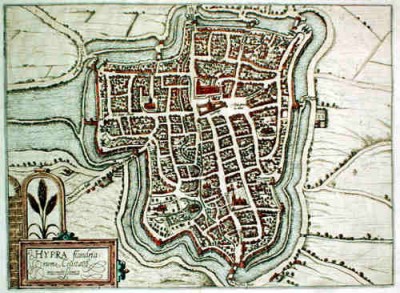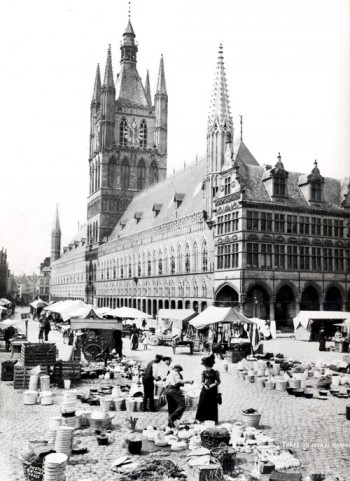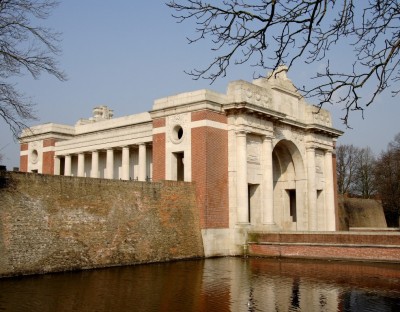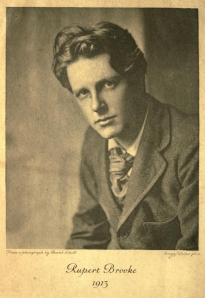The name of Ypres – or Wipers in British Tommy parlance – is known to history, unlike the names of thousands killed there. During the First World War, the town was flattened and its surrounding fields churned into a swamp. One hundred years on, all’s quiet…
 Ypres, named after the elm trees that grew there in ancient times, has a turbulent history. In the first century BCE, it was taken by the Romans, who fortified what was a natural defensive point. As a medieval trading post, textiles from Ypres could be found in the markets of Novgorod in Russia in the early 12th century and by the 13th century it already had a population of 40,000. Renowned for its linen trade with England, Chaucer jokes in the Canterbury Tales that the Wife of Bath was better at cloth-making than the people of Ypres and Ghent.
Ypres, named after the elm trees that grew there in ancient times, has a turbulent history. In the first century BCE, it was taken by the Romans, who fortified what was a natural defensive point. As a medieval trading post, textiles from Ypres could be found in the markets of Novgorod in Russia in the early 12th century and by the 13th century it already had a population of 40,000. Renowned for its linen trade with England, Chaucer jokes in the Canterbury Tales that the Wife of Bath was better at cloth-making than the people of Ypres and Ghent.
 In 1241 a fire consumed much of the medieval wooden city, but it rose from the ashes and the famous Cloth Hall was built, which stood until its destruction during the First World War. The building today is an exact copy of the original, rebuilt after the war and home to the In Flanders Fields Museum. UNESCO designated the whole complex a World Heritage Site in 1999.
In 1241 a fire consumed much of the medieval wooden city, but it rose from the ashes and the famous Cloth Hall was built, which stood until its destruction during the First World War. The building today is an exact copy of the original, rebuilt after the war and home to the In Flanders Fields Museum. UNESCO designated the whole complex a World Heritage Site in 1999.
Ypres occupied a strategic position during World War I because it stood in the path of Germany’s planned sweep across Belgium and into France (the Schlieffen Plan carried out by Helmuth von Moltke the Younger). The neutrality of Belgium was guaranteed by Britain, so its invasion brought the British Empire into the war. The German army surrounded Ypres on three sides and massively bombarded it. To counterattack, British, French, and allied forces made costly advances from the Ypres Salient into the German lines on the surrounding hills.
 The Menin Gate Memorial to the Missing commemorates 54,896 soldiers of the British Commonwealth who fell in the Ypres Salient before 15 August 1917 and who have no known grave. Those who died after that date – and all from New Zealand and Newfoundland – are commemorated elsewhere.
The Menin Gate Memorial to the Missing commemorates 54,896 soldiers of the British Commonwealth who fell in the Ypres Salient before 15 August 1917 and who have no known grave. Those who died after that date – and all from New Zealand and Newfoundland – are commemorated elsewhere.
The poem “In Flanders Fields” was scribbled down near Ypres by Canadian physician Lt. Colonel John McCrae. He was inspired to write it on 3 May 1915, after overseeing the funeral of friend and fellow soldier Alexis Helmer, who died in the Second Battle of Ypres. The poem was first published on 8 December 1915 in the London-based magazine Punch.
It was at Ypres that the German army launched one of the first chemical attacks in the history of warfare. McCrae described one attack in a letter written to his mother: “For seventeen days and seventeen nights none of us have had our clothes off, nor our boots even, except occasionally. In all that time while I was awake, gunfire and rifle fire never ceased for sixty seconds… And behind it all was the constant background of the sights of the dead, the wounded, the maimed, and a terrible anxiety lest the line should give way.”
Another well known poem, the fifth in a series of War Sonnets written by the British poet Rupert Brooke in the autumn of 1914, is called “The Soldier”. It achieved instant popularity when the Dean of St Paul’s Cathedral read it at the Easter Sunday service just three weeks before Brooke’s death in April 1915:
 “If I should die, think only this of me:
“If I should die, think only this of me:
That there’s some corner of a foreign field
That is forever England. There shall be
In that rich earth a richer dust concealed;
A dust whom England bore, shaped, made aware,
Gave, once, her flowers to love, her ways to roam,
A body of England’s, breathing English air,
Washed by the rivers, blest by the suns of home.
And think, this heart, all evil shed away,
A pulse in the eternal mind, no less
Gives somewhere back the thoughts by England given;
Her sights and sounds; dreams happy as her day;
And laughter, learnt of friends; and gentleness,
In hearts at peace, under an English heaven.”
Ironically, both McCrae and Brooke were victims of the First World War, but neither was killed in battle. McCrae died of pneumonia on 28 January 1918 while still commanding No. 3 Canadian General Hospital at Boulogne, France. Brooke developed sepsis from an infected mosquito bite and died on 23 April 1915 in a French hospital ship moored off the island of Skyros in the Aegean on his way to join the Gallipoli Campaign.
My French version:
Si je mourais, qu’il soit de moi mémoire,
Disant qu’un coin de champ à l’étranger
Est anglais pour toujours. La terre noire
S’enrichira d’un terreau moins léger ;
Terreau dont l’Angleterre a fait l’histoire
Avec ses fleurs, ses chemins passagers ;
Un corps d’Anglais dans son vivre et son boire
Et son soleil et son art de nager.
Pensez : ce coeur, que tout mal abandonne,
Battement d’absolu… pourtant redonne
À l’Angleterre un peu ce qu’il devait ;
La vue, le son, le bonheur dans les rêves,
Le rire des amis, la paix, sans trêve,
Dans la douceur d’un firmament anglais.